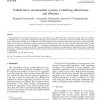Free Online Productivity Tools
i2Speak
i2Symbol
i2OCR
iTex2Img
iWeb2Print
iWeb2Shot
i2Type
iPdf2Split
iPdf2Merge
i2Bopomofo
i2Arabic
i2Style
i2Image
i2PDF
iLatex2Rtf
Sci2ools
128
click to vote
ESWA
2008
2008
Collaborative recommender systems: Combining effectiveness and efficiency
Recommender systems base their operation on past user ratings over a collection of items, for instance, books, CDs, etc. Collaborative filtering (CF) is a successful recommendation technique that confronts the ``information overload'' problem. Memory-based algorithms recommend according to the preferences of nearest neighbors, and model-based algorithms recommend by first developing a model of user ratings. In this paper, we bring to surface factors that affect CF process in order to identify existing false beliefs. In terms of accuracy, by being able to view the ``big picture'', we propose new approaches that substantially improve the performance of CF algorithms. For instance, we obtain more than 40% increase in precision in comparison to widely-used CF algorithms. In terms of efficiency, we propose a model-based approach based on latent semantic indexing (LSI), that reduces execution times at least 50% than the classic CF algorithms.
Related Content
| Added | 10 Dec 2010 |
| Updated | 10 Dec 2010 |
| Type | Journal |
| Year | 2008 |
| Where | ESWA |
| Authors | Panagiotis Symeonidis, Alexandros Nanopoulos, Apostolos N. Papadopoulos, Yannis Manolopoulos |
Comments (0)

